Learning French (In-Depth Tutorial for 2021)
by Marissa Blaszko · January 1, 2021
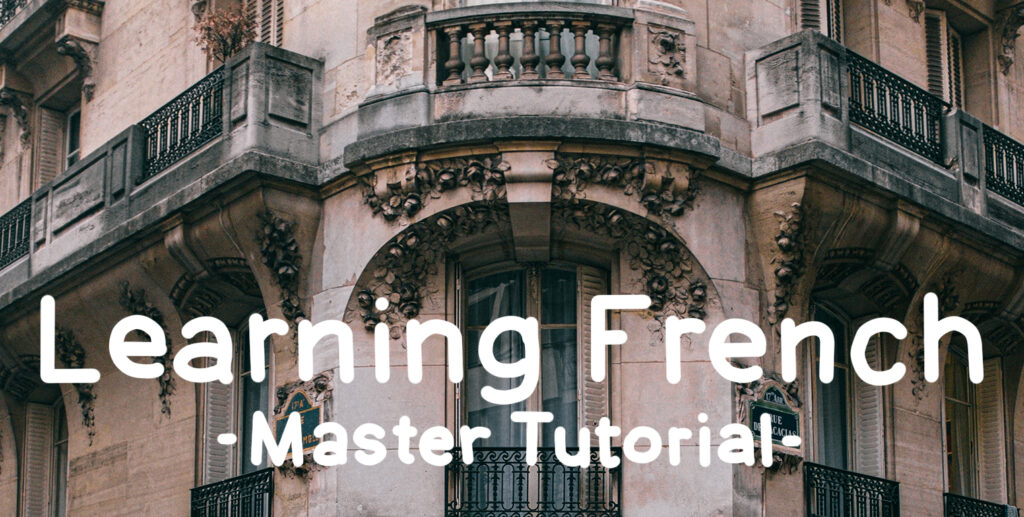
Learning French doesn’t have to be all textbooks and classrooms.
Learning French doesn’t even have to be language apps or far-away immersion.
That’s because in this article, I’ll show you how I have learned half a dozen languages by having fun and getting creative.
I know because I used to be a language failure.
I too used to believe the worst myths about language learning; fell prey to common pitfalls; and failed at learning French three different times.
And now I speak it fluently.
This article is designed as an interactive tutorial. Use it slowly, because by the end you will:
- understand how polyglots learn languages systematically and effectively;
- have a list of quality resources you want to use to learn French;
- have a plan to do your own creative at-home French immersion;
- and have a path to actually stick with your language learning plan.
Here’s all you need to do:
✏️ When you see this pencil, it’s an invitation to reflect.
You can do this either by journaling or pausing to consider if what was just said reflects your own situation.
✅ When you see this checkmark, it’s an invitation to take action.
Take notes or write down what steps you want to take when you’re done reading this article.
Note: this article is specifically about learning French from zero.
If you are trying to relearn French, click here for a different tutorial.
And FYI, some of the products I personally use and recommend are posted through here as affiliate links, meaning I may make a small commission of purchases at no cost to you.
Table of Contents
1. Language Learning 101
A polyglot is a person who speaks 6+ languages.
And a common myth about polyglots is that they are simply “good at languages”.
But that’s not true.
I know, because I was a language failure.
I not only failed out of high school and university language classes, but I forgot my own native language.
(But that’s a story for later.)
Amazing language learners are simply amazing planners who understand the process of language learning.
So let’s build you a plan.
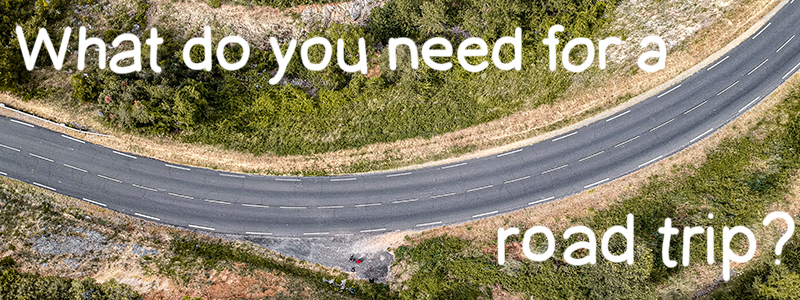
There are dozens of people online claiming that if you buy their products they will teach you French in something like:
- 2 weeks,
- 3 months,
- or 6 months (depending on the brand).
But instead of promising you French “in 10 easy steps” or “just 2 months” we’re going to use the metaphor of a road trip.
Why?
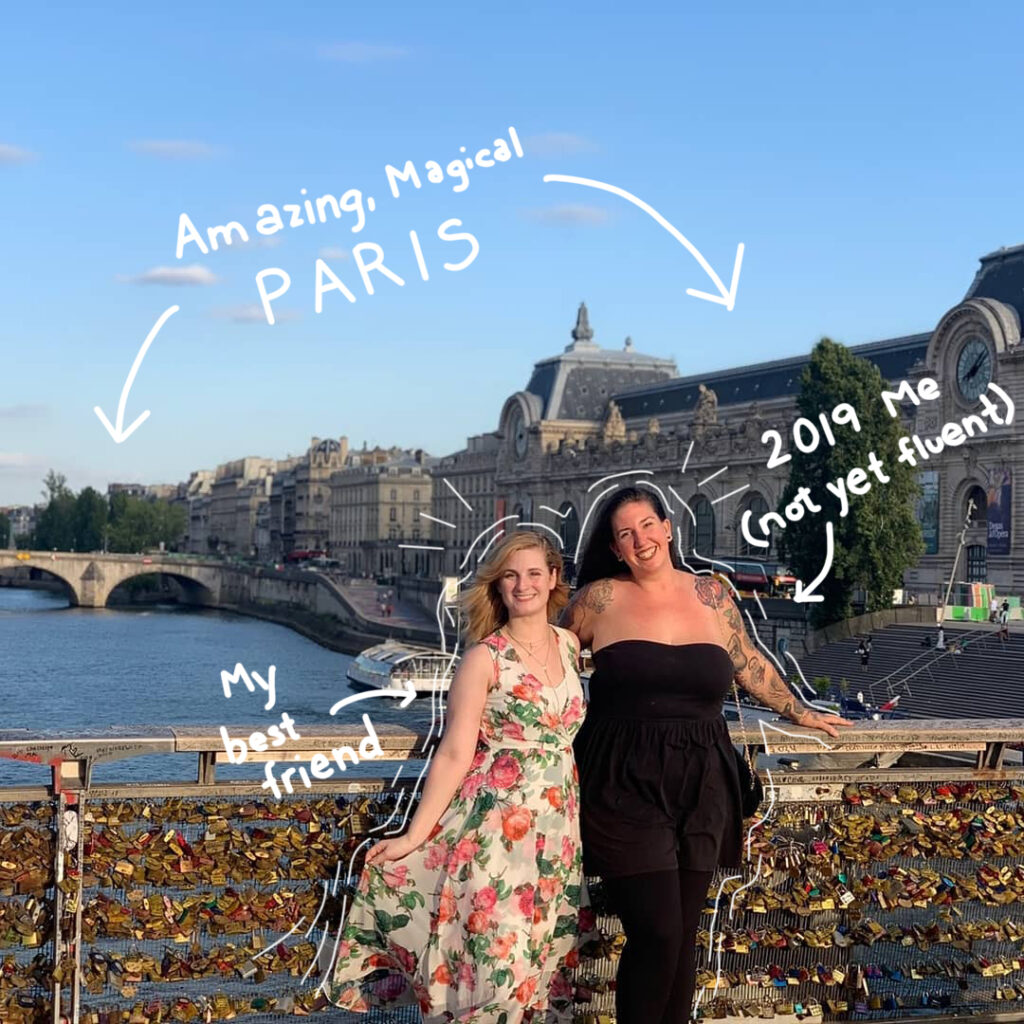
First of all, learning French doesn’t have to be some terrible chore you want to get over.
It doesn’t have to be the boring commute you wish was over already.
It can be an amazing adventure full of new experiences, new people, and beautiful vistas.
So instead of obsessing about the end goal of “speaking French fluently” we can look at it as a road trip and focus on enjoying the process.
But more than that, there’s also this fact:
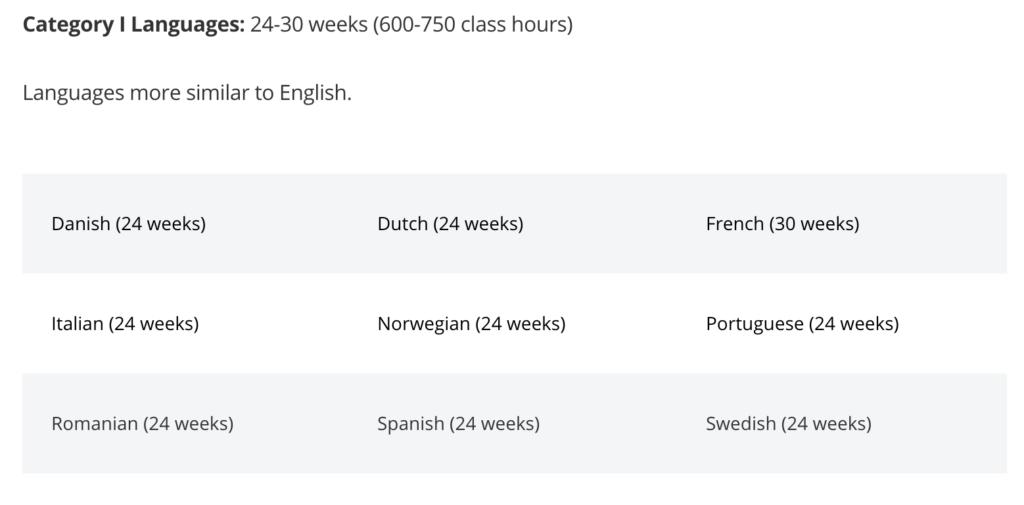
This chart is from the US State Department.
It shows how if you work at French full time, 40 hours a week, you could learn it in 30 weeks.
But if you have a full-time job (like I do)?
People like us will have to take a while longer. We’ll have to split up that big block of 750 hours over several months, or even years.
So don’t let snake oil salesmen fool you. No one magical product is going to magically beam French into your head in just a few wdays.
So again: we’re looking at the process of learning French as a long-term adventure.
And just like any good road trip, language learning can be such an amazing journey that you can enjoy at every step.
Now let’s plan your trip.
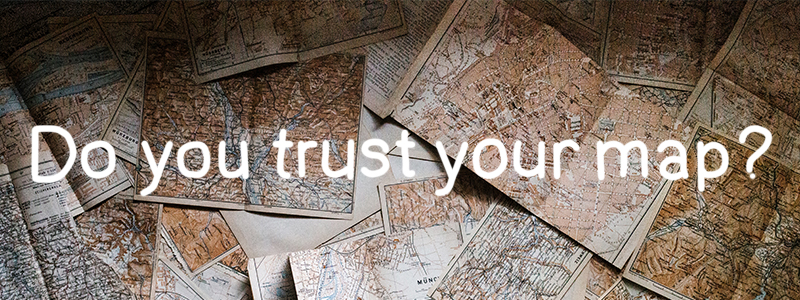
The first thing you’ll need is a road map.
This means one guiding resource that will help you navigate something as complicated as a language without getting lost.
The important thing I want to stress here is that your map needs to be up-to-date, comprehensive, and a good fit for you personally.
Cheap apps, outdated textbooks, or incomplete guides will get you lost on your journey.
But once you have a quality and comprehensive guide, everything else will fall into place.
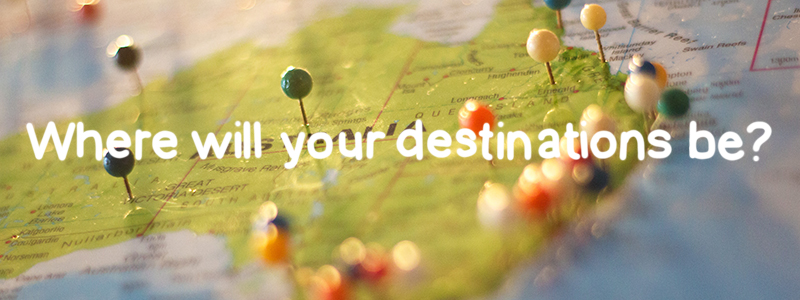
And remember: the point of a road trip isn’t to get back home as fast as possible.
It’s to enjoy all of the many things along the way.
So let’s stop and do the first part of our tutorial.
✏️ REFLECT: What will your French goals be?
Think beyond “becoming fluent”.
When you see yourself using French, what do you see? Where are you, what are you doing, and who are you with?
Write that down on your piece of paper.
✏️ REFLECT: What can some mini-goals be?
If your goal is to read French novels, maybe reading your first poem will be a mini-goal.
If your goal is to travel to Paris, maybe watching a travel documentary in French will be a mini-goal.
If your goal is to work with clients, maybe your mini-goal is your first conversation.
Go ahead and brainstorm, but leave room in this section of your piece of paper for us to come back to.
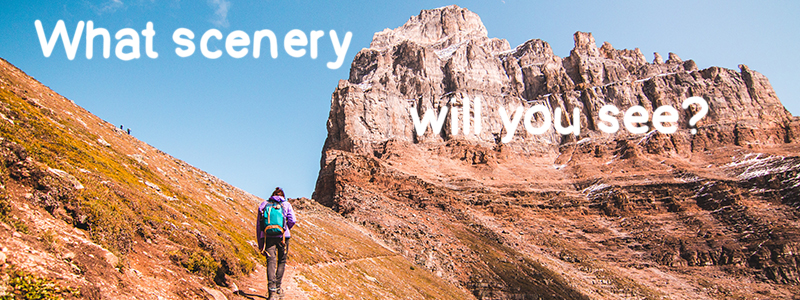
Now that you’ve thought about your destination, let’s talk about what you’ll see before you get there.
Because one of the amazing things about traveling by car, bus, or train is passing by gorgeous landscapes, fun rest stops, and plenty of interesting new places.
So later in this tutorial, we’ll be covering French language immersion in-depth.

That’s because you can start enjoying French from a very low level.
You can enjoy French music before you even understand a single word.
You can enjoy French recipes before you can read a novel.
And you can enjoy French podcasts before you’re fluent.
This is why it’s not worth rushing or cramming your French.
Because when you obsess about the outcome, you forgot to stop and look around you.
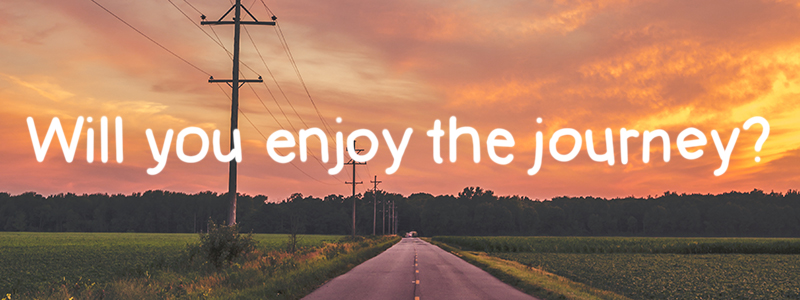
Now, let’s start seriously putting together your plan for learning French.
Because if we get serious with a pen and paper now, the rest will be easy to sit back and enjoy.
2. Learning French Basics
In this section, we will officially find you that perfect road map.
To start, there are 3 types of guiding you can use to learn French.
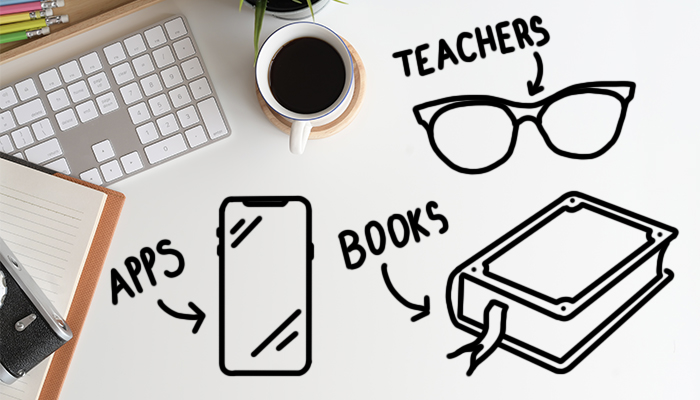
Within each of these 3 categories, there are dozens of individual options.
So what makes a guiding resource good or bad?
How do you start to narrow down which category of resource you want to try so you can pick out which specific resource you want?
French Guiding Resource Check-List
Every guide must have:
- Grammar instruction (that first teaches you the basic then builds on your success)
- Vocabulary (organized in units)
- Ways to practice both
A great guide has:
- Practice listening and reading in the language
- Exercises so you write full sentences
- Exercises where you can practice speaking full sentences
- Cultural context
So how do the three types of guiding resources rank?
👩🏫 French teachers or classrooms are by far the most complete resource for learning French. A good classroom will teach you grammar and vocabulary through culture, and private tutoring will make sure you have plenty of speaking practice. But if all you do is sit and silently listen in a big classroom? No wonder so many students don’t end up learning French!
📚 French textbooks, if used with workbooks, can meet a lot of the qualifications we need. But unless they have plenty of exercises and practice space, they won’t help things really sink in. (This is why I always buy textbooks that come with supporting workbooks full of exercises.)
📱 French language apps tend to fall flat. Things like DuoLingo or Mango do technically count as a guiding resource because it has instruction, but because all you’re doing is playing through word banks it’s not amazing.
But the most important thing is that a guide helps you.
So let’s see what type of road map might serve you best:
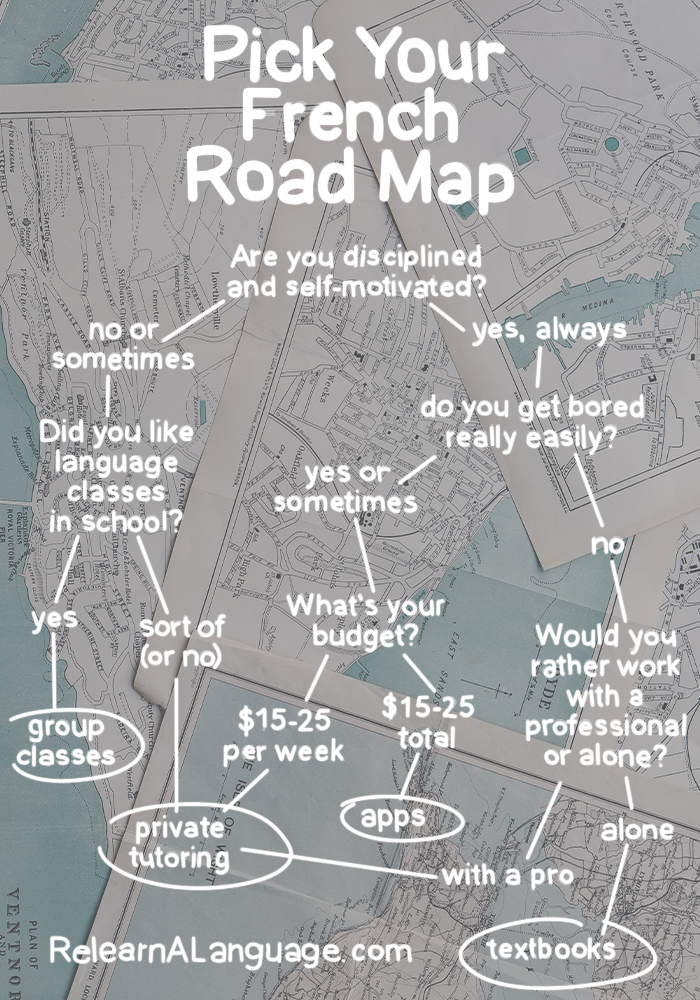
Now: this is only a suggestion.
If you ended up one type of guiding resource but had your heart set on another, follow your heart.
But each type of resource has it’s own strengths and weaknesses for different people, and these would be my suggestions.
So now let’s show you how to start narrowing down your search.
✅ PLAN: What genre of guiding resource do you want to look into first?
Write down the 1 or 2 categories you want to start investigating as a start.
1. Apps For Learning French
We’ve gone into a few reasons that I don’t love apps as a guiding resource. (Although I do like using them for fun on the side.)
But if you really have your heart set on using them for learning French, here are my tips:
Where To Start:
- Apps that have you listen and speak (Michel Thomas, Mango, Pimsleur)
- Apps with good listening content (like Memrise courses)
- Apps that only use vocabulary like uTalk (but can be used later for fun)
- Apps that rely heavily on word banks like DuoLingo (which stop you from truly memorizing)
2. Learning French with Textbooks
A good textbook or workbook can be an amazing resource. But generally, unless you’re a seasoned language learner, you might find it hard to use them to their fullest extend.
My personal favorite tip is to use a textbook in your free time along with personal tutoring (which we’ll discuss in a minute).
But no matter what, here are some tips for online shopping:
Where To Start:
- Textbooks with multimedia listening or watching (Assimil, French Uncovered)
- Workbooks with lots of exercises (Practice Makes Perfect)
Less Successful:
- Textbooks that only offer explanations without much practice (Teach Yourself series)
- Textbooks made for classrooms and not solo learners (something you find at a charity shop / used book store)
3. Group French Classes
When I was first learning French, group classes in Quebec were fun and social.
But they were also extremely expensive, and if I didn’t understand a certain lesson it felt like the class was going on without me.
Still here’s how you could start looking for them:
Where To Start:
- Local community colleges often have university-level French classes which you can audit (without being a student) for little money
- French immersion school abroad can be easily found with a google search, and some even have group classes online which can be done from home before or after your trip
Less Successful:
- Adult French classes in local community centers don’t have the same oversight or long-term success rate as university classes, despite the qualifications of any individual teacher
- The French Alliance has many group classes around the world, but student satisfaction often varies dramatically depending on the local chapter’s policies.
4. Private French Tutors
I haven’t seen any studies done about the long-term French learning success of adult students in private tutoring classes vs group classes, but in my experience students who take private online classes have amazing results.
- There are three main online directories of private French tutors: iTalki, Preply, and Verbling. (Get $10 off your first iTalki lesson here.)
- There are also amazing (amazing) French teachers on social media
- Apps that only use vocabulary like uTalk (but can be used later for fun)
- Apps that rely heavily on word banks like DuoLingo (which stop you from truly memorizing)
✅ PLAN: Where are you going to first look for your French guiding resource?
When will you search by? When will you make a final decision?

There is one final piece of information I want to give you about finding your guiding resource for learning French.
You’ve never learned French before.
So you haven’t yet developed an internal gauge for whether or not a resource is working or not.
Just because something is hard or takes a long time doesn’t mean it’s not working.
But just because it’s fun and you’re moving through it doesn’t mean you are actually learning French.
So start with 1 or 2 guiding resources.
See which one seems to make the most sense and is giving you the best practice with the language.
But resist the (expensive) urge to keep buying more resources until you find some magic bullet.
Languages cannot be purchased, only learned.
So trust the process. Experiment a bit.
But don’t buy as much as you can thinking that it will help you learn French faster.
The only thing that will help you learn French is your own patience and work.
🛑 PAUSE: By this point, you should have picked out a guiding resource for learning French.
Next, we’ll get to the fun stuff. But you need your road map before you can enjoy the scenery!
3. Intro to French Immersion
Now, enough with all the books and grammar and classes.
We’re going to start having fun.
And not only because having fun while learning French is…. well, fun.
But because having fun is an amazing educational policy.

Think of the last trip you took. Think of the faces of the people you were with, the food you ate, or the buildings you saw.
You probably remember those moments with a lot more detail than you remember what you were listening to on your commute last Wednesday.
Among other things, this is because our reward chemical, serotonin, helps our memory.
A lot.
When we accomplish something or “unlock” something great, our brain holds onto that moment because it wants it to happen again.
So we’re going to tap into your brain’s natural serotonin-making abilities to unlock amazing language learning abilities with French immersion.
But first, we start by looking over myths and facts about French immersion.
(And after that, we’ll help you build your own French immersion plan.)
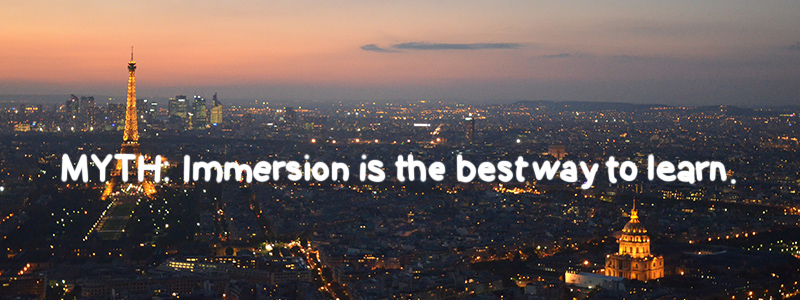
FACT: Linguists who study adult language learners have found over and over again that immersion is great–just like we said above, it produces great experiences that open you up to learning.
But those studies have also found that nothing is better for adult learners than explicit grammar and vocabulary explanations.
This is why you need that guiding resource we talked about above.
(A great book on this myth, if you’re interested, is called “Becoming Fluent” by Roger Kreuz and Richard Roberts.)

FACT: We will be focusing the rest of this article in how to learn French through immersion at home.
It’s an easier, cheaper, and potentially less-stressful way to learn.
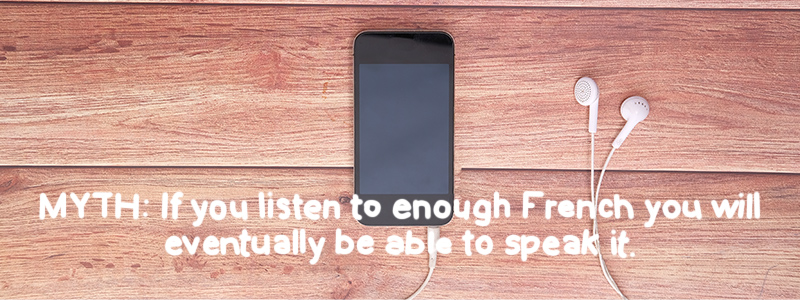
FACT: Skill transference is largely a myth. Some linguists used to think that if you listened to enough French you’d be able to transfer those skills into speaking, but in the past 20 years has been largely disproved.
Instead, you need to train each skill (listening, speaking, writing, and reading) separately–so we’ll be diving into each one in the following sections.
(If you want to learn more about this older theory, check out Stephen Krashen’s “Input Hypothesis” and all of the critiques and advances since that paper was first published in the 1980’s.)
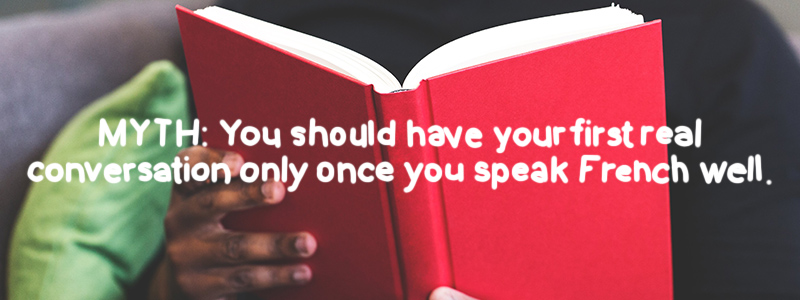
FACT: One of the many paradoxes of language learning is that you must start speaking before you’re ready to start speaking.
For many people (like myself) this was the first day or week that we began learning French. For others, it might be after a few weeks or months.
But like we mentioned above: skills don’t truly transfer. So in order to learn to speak, you need to start actually speaking.
(Many amazing language learners, from Michel Thomas to “Ultralearning” author Scott Young emphasis speaking on Day 1. The only reason, in my opinion, not to do this is if it gives you such bad anxiety that you freeze up. Trust your gut, but know that nerves are normal.)
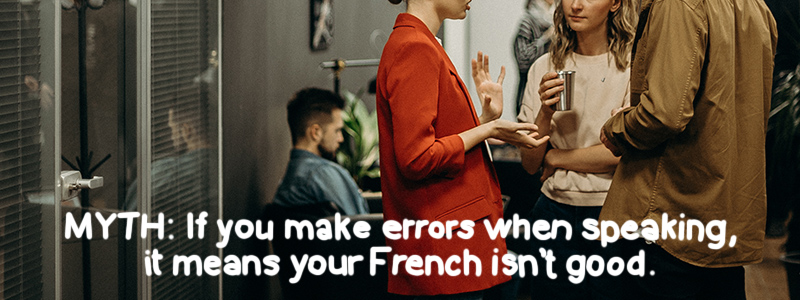
FACT: Making errors while you’re learning French is normal. And making errors once you speak fluent French is normal
The “native speaker double standard” is that we all make regular errors when speaking our native languages–but they’re often dismissed as “obscure grammar” or a “slip of the tongue”.
So if you don’t lose sleep over some error you made while speaking last week, don’t stress about your French.
✏️ REFLECT: What myth surprised you the most?
Did you hold any of these myths before? Do you feel like you need to do further research to fully disprove them to yourself?
Skillfully Planning French Immersion
Now that you understand the basics of why we’re going to use immersion for learning French, we’re going to skillfully add French into your life.
Your key to French immersion to success is doing things you love with consistency.
That’s it.
And to help you with the consistency part, I released a no-strings-attached mini-course based on my personal habit journals for new language learners to enjoy.
(Because really: I love this.)
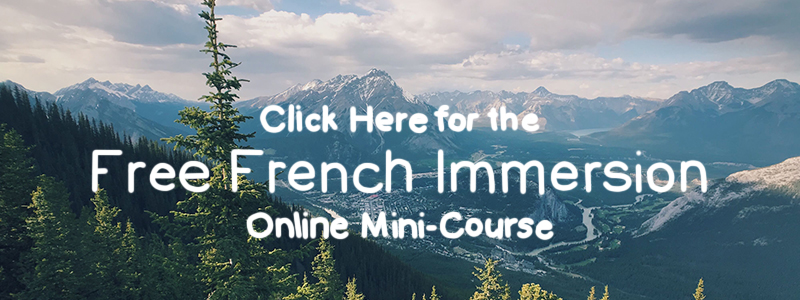
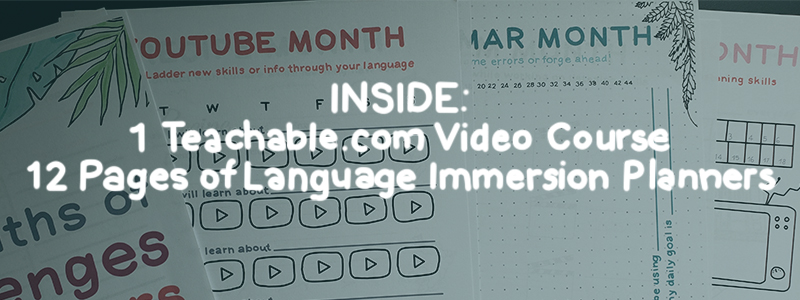
Click either of the above images to get access to the course.
You’ll receive the link in an email, and then we can continue with all of the rest of this tutorial and its emphasis on learning French through pure fun.
4. Listening to French
There are so, so many fun ways to learn French through listening practice.
In this article, I’ll give you a few of my favorite ways, with links to resources, plus links to even longer lists.
My suggestion is to write down which resources you want to start using on Day 1 as you’re doing this tutorial.
Then, save the additional links in your browser or on Pinterest so you can reference them as your French improves.
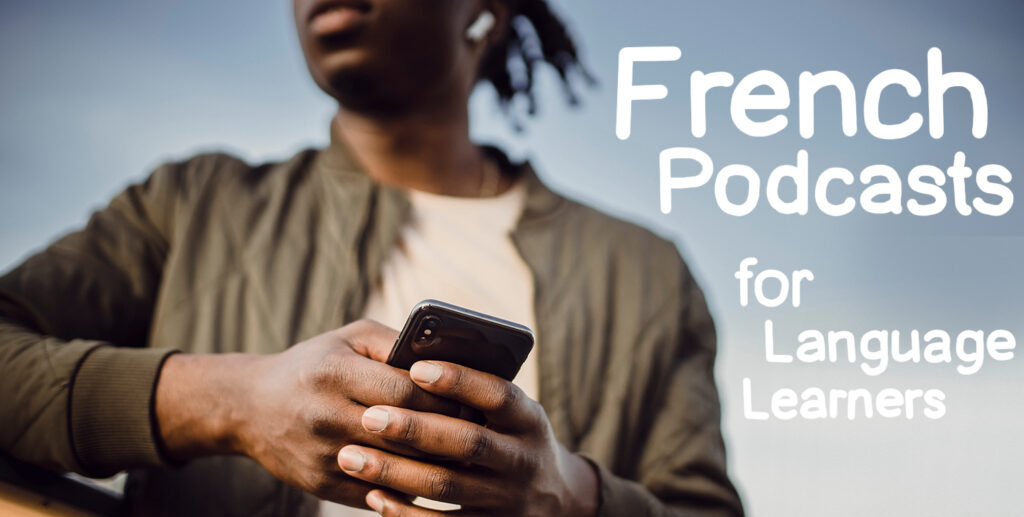
Learning French with Podcasts
1. The Duolingo French Podcast
Schedule: Seasons
Transcripts: Free on their site
Listen: Apple | Google | Spotify
Like I’ve said above: I’m hot a huge fan of the DuoLingo app for actually learning French, but the podcast is a gem. From bakers in Afghanistan to ocean explorers from France, each episode will leave you excited to improve your French.
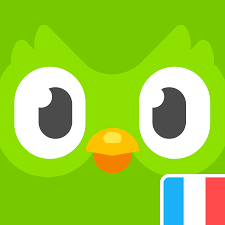
2. News in Slow French
Schedule: Weekly
Transcripts: $20/mo + bonus materials
Listen: Apple | Google | Spotify
News in Slow French is probably the easiest monolingual French podcast to listen to. However, only tiny segments are available for free. For weekly episodes, transcripts, and language learning exercises it’s $20 a month on their own French learning platform.

3. Learning French Through Stories
Schedule: Weekly(ish)
Transcripts: In each episode description
Listen: Apple | Google | Spotify
These short bilingual episodes teach French through short stories. Each episode has either a mini-lesson (in English) followed by fun phrases (in French) or a short story (in French) followed by a translation and lesson (in English).
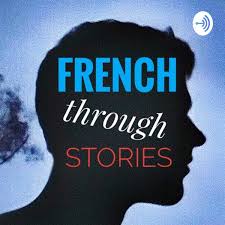
Click Here For Our Full French Podcast List
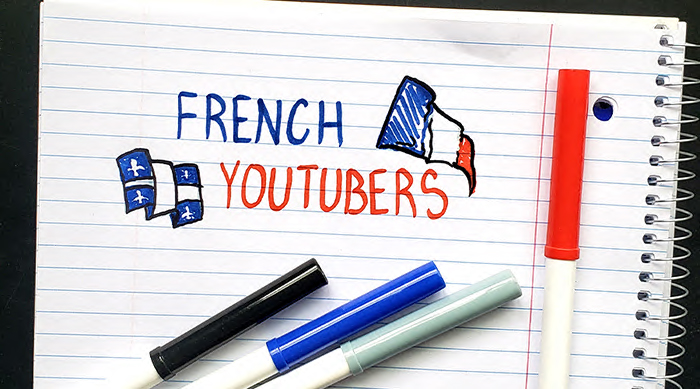
French YouTubers
1. Easy French
Country: France 🇫🇷
Channel Type: Listening Practice
Subtitles: Built-in English/French
Channel Tags: Culture, travel, daily life
2. Learn French with the Sims (YouTube Playlist)
Country: France 🇫🇷
Channel Type: Listening Practice
Subtitles: English and French
Channel Tags: daily life, household vocabulary, present and past tenses
3. French Pod 101
Country: France 🇫🇷
Channel Type: Education
Subtitles: auto-generated English
Channel Tags: grammar, vocabulary
Click Here For Our Beginner French YouTube List
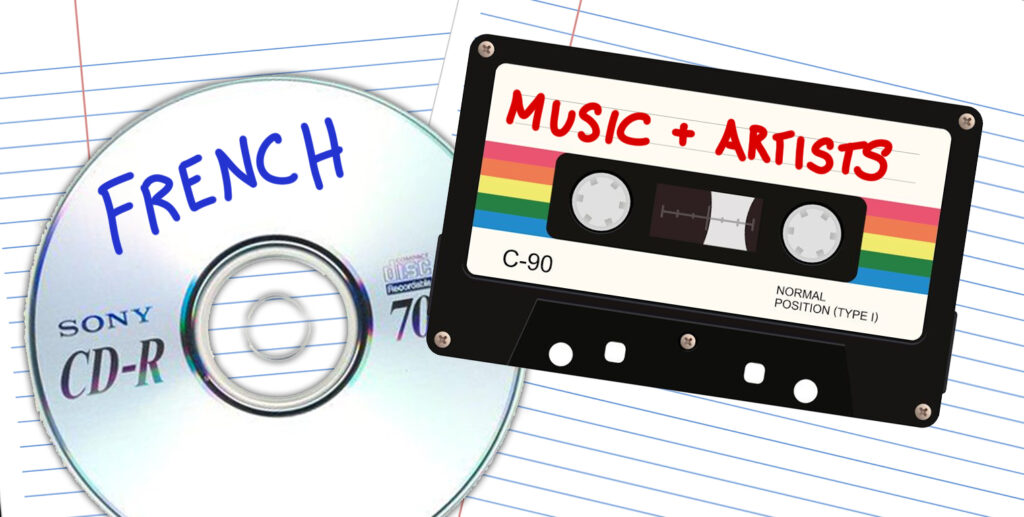
Learning French Vocabulary through Music
There are 3 types of music you might want to use for learning French, so we’ll go into each type here (and give you links to larger lists).
Music Specifically for Learning French
There are YouTube channels and playlists specifically for French students trying to learn vocabulary.
The positive thing is that they’re extremely catchy and useful.
But the drawback is that they’re not very fun to listen to.
Click here for our full list.
Contemporary French Music
Contemporary French music is often way more fun to listen to and will teach you plenty of slang and great phrases.
But the biggest drawback is that it can often be some of the hardest to understand (although lyrics are easy to look up).
Click here for our full list.
Classic French Music
Classic French music will give you a unique window into French culture and history. But like contemporary hits, it’s not always the easiest to understand (and might not be your favorite genre of music).
Click here for our full list.
✅ PLAN: What channels, podcasts, or artists are you going to check out?
When will you listen to French? How will you track your consistancy?
5. Reading and Writing in French
Reading and writing are the most underrated skills in learning French.
That’s because at first, you might find understanding spoken French hard. But reading allows you to “replay” any individual word or phrase infinite times until you understand it.
The same goes for writing. If you think speaking in French is difficult, writing is way less stressful: because if you make an error, no one notices.
Reading in French
Merde, It's Not Easy to Learn French
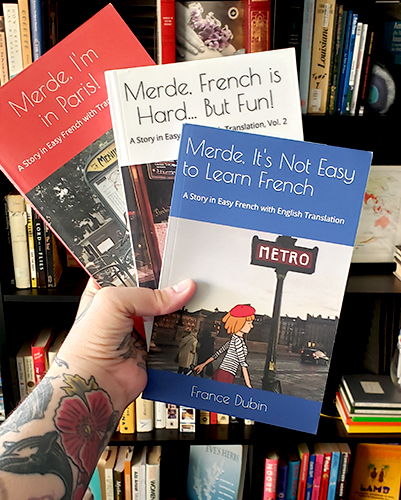
Genre: Short Stories / Travel non-fiction
Pages: 125 (First Page)
Summary: This trilogy of fun adventures follows it’s protagonist as she tries to learn French as an adult. Full of frustration and silly situations, French students will likely not only find it relatable but inspiring.
Follow along with her diary entries, misadventures, and even French exercises as you discover French with her!
Le Petit Prince
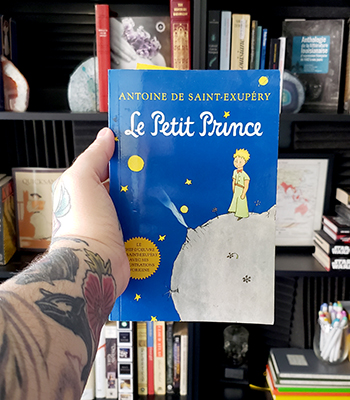
Genre: Fantasy / Illustrated
Pages: 214 (First Page)
Summary: A traveler moves through the Sahara when he encounters a small child who demands the traveler draw him a sheep. This fantastic and surreal exploration of identity and adulthood was intended for children but has become a literary classic in over 200 languages for readers of all ages.
Short Stories in French
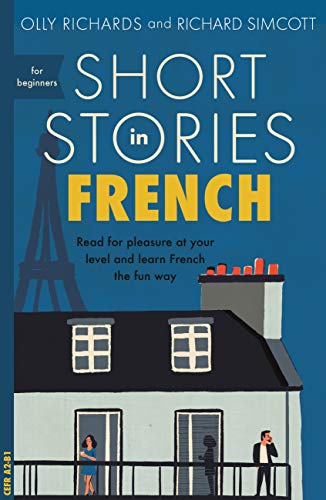
Genre: Short Stories
Pages: 252 (First Page)
Summary: This collection of simple stories was made with French students in mind. Written entirely in the present tense with easy-to-follow plots, the entire “Short Stories by Olly” series is a good first attempt for students trying to break out of workbooks and into reading.
Click Here For More French Books
Learning to Write in French
Speaking French and writing in French can feel like two entirely different languages sometimes. The spelling, pronunciation, and grammar rules might feel incoherent.
But writing is a precise, slowed-down version of speaking in a lot of ways.
By giving yourself time to think about what word you want to use (and what grammar you need) you’re test driving out new phrases and ideas which you can bring into conversation later.
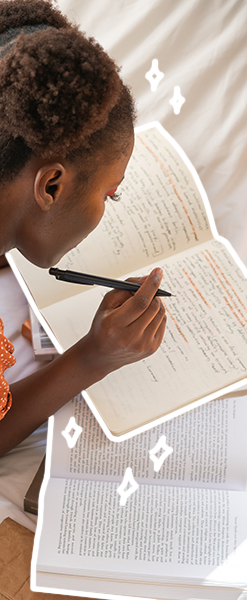
Everyday French Writing Ideas:
- Our list of 400+ conversation topics
- Dairies about your day
- Reviews of French films or TV series
- To-do lists or grocery lists
- Scrapbooking past or future trips to French-speaking places
- Leaving social media comments for content creators you support (this helps more people see their work, so they’re likely to write back to you!)
- Writing thank-you emails to authors, podcast hosts, or tutors who’s work has helped you learn French
- Writing summaries of articles, podcasts, or book chapters to make them more interactive
My suggestion is that you write a small amount of French every day and not stress yourself out about big chunks of writing time.
(One of the many reasons our immersion mini-course is geared towards doing a tiny bit every day during a month.)
Click Here for all of our writing and discussion prompts
✅ PLAN: What will be the first book you want to read in French?
Do you have any ideas for exploring French writing yet?
6. Learning to Speak French
Remember: the great paradox of language learning is that you have to start speaking a language before you’re ready to start speaking in the language.
So we’re going to charge ahead and give you two safe spaces where you can start speaking French free of criticism or pressure.
From there, you can build up to real-life conversations with confidence.
French Conversation Practice
- Browse around and find a few community teachers with 500+ lessons (not necessarily the cheapest, but a good investment).
- Check to make sure their schedule aligns with your own.
- Message several tutors and explain your level of French and goals.
- Give them a list of topics you are currently learning about and want to discuss, no matter how simple those topics are.
- Book 2-4 of them for a trial 30min lesson each.
- Continue working with the ones that you got along with and make you feel best about your French potential.
- Keep them up to date with what you’re studying with your guiding resource so you can continue to reinforce lessons with conversations as you learn.
French Language Exchanges
For a long time, I wasn’t sold on the idea of learning French through language exchanges.
The idea is that you hop on a video call for 60min with a native French speaker learning your language.
- For 30min they patiently listen to you try your best in French.
- Then for 30min, you patiently listen to them try their best in your language.
My original hesitation was that I simply didn’t want to inconvenience a stranger with my bad French. I wasn’t sure they would have the patience, or what we could possibly talk about.
I was happily (and quickly) proven wrong.
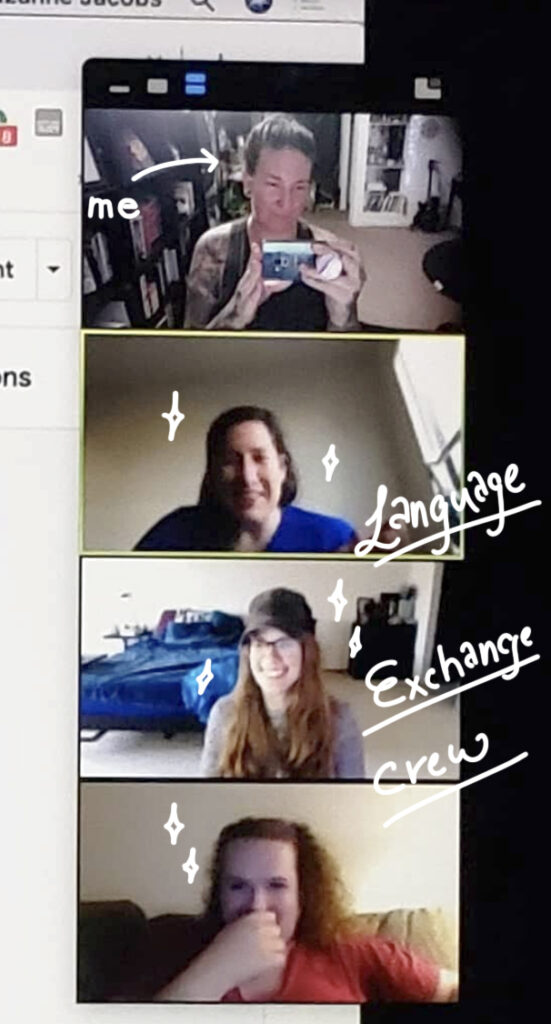
First of all, you won’t be inconveniencing anyone with your language skills. If someone signs up for a language exchange, they also want someone to be patient with them and understand how uncomfortable it is to work on an imperfect language with a stranger.
And as for conversation topics? I wrote a whole blog post with 400+ (nearly 500 at this point) topics you could be chatting about together.
It’s the same one I linked to in the writing section, but it’s easily sharable for any teacher or language exchange partner you want to explore it with.
(I use it myself all the time.)
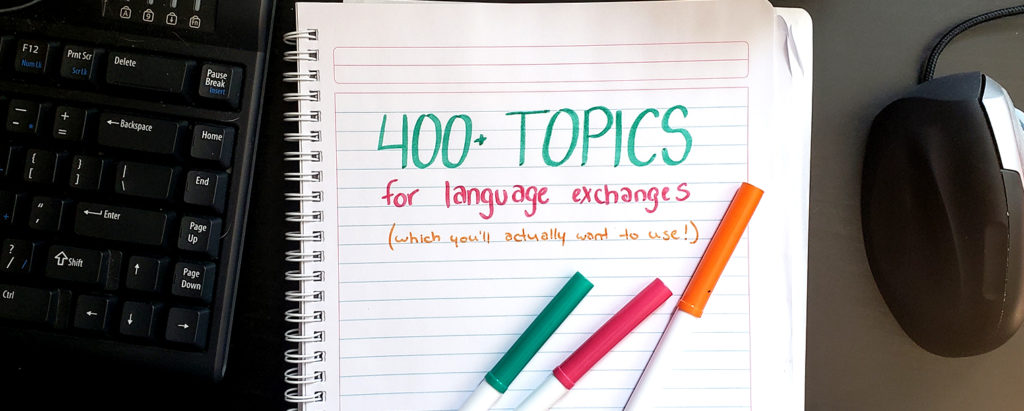
Click the image above to open our list of over 400 language exchange topics.
And how do you find language exchange partners?
First of all, there are apps like Tandem or Hello Talk that are all about matching up language learners! But I’ve used the instagram hashtag #languageexchange with a lot of great luck.
✅ PLAN: When will you start speaking? Who will you speak with?
How will you get over the normal feelings of anxiety or not feeling ready? What can you do to hold yourself accountable?
7. Embodying French
This final French immersion section isn’t about practicing one particular skill (like the sections above).
It’s about fully integrating French into your life and living in it.
Our minds are not separate from our bodies. By connecting some of the most intimate things we do (cooking, exercising) with a new part of ourselves (learning French) we can become closer to the language and enjoy the process in new ways.
So while I’ll be covering two ideas for learning French by embodying it here, I invite you to start looking at your daily routine in a creative way and wondering: can I do this in French?
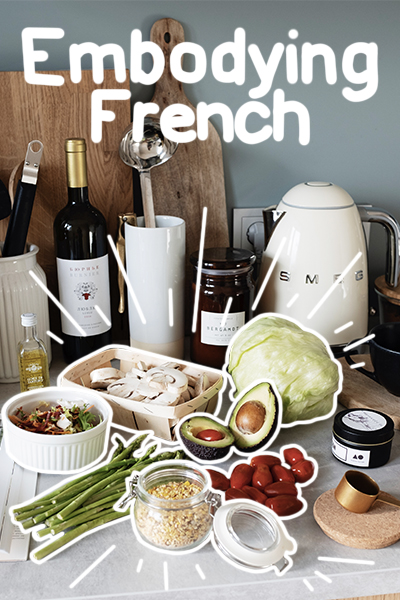
Enjoying French through Yoga
1. Yogalune
📍 🇧🇪 Belgium
Yogalune has the most calming voice of any French yoga teacher on this list and some of the prettiest visuals. Make sure you check out her meditation videos as well!
2. Diva Yoga
📍 🇨🇦 Canada
Diva Yoga has over 800 yoga videos for different types of needs or moods–by far the most of any channel on this list. If you’re trying to build a new French yoga habit, I suggest their 365 days playlist.
3. Upakrama Yoga
📍 🇫🇷 France
Upakrama Yoga is the smallest channel on this list, but the quality of her yoga videos is very very high. Most of her videos are done outside but her voice-over is added later so you don’t have to listen to wind, waves, or anything else. (She also uploads many of her visions with Spanish versions if you also speak or study other languages.)
Click Here FOR MORE FRENCH YOGA
Learning French through Cooking
Some of the best memories I have of my personal French journey involve food.
From being invited over professors’ houses in Canada for apéritifs to taking a cooking class in Paris, learning about food and culture through French has been more rewarding than any experience I could have had with a textbook.
Ideas for Learning French with Cooking
- Make your grocery lists in French
- Follow online recipes in French
- Leave comments on cooking blogs in French
- Watch French cooking shows on Netflix
- Watch French food vloggers on YouTube
- Translate your own recipes into French
- Take an AirBNB cooking class in Quebec, France, Belgium, Switzerland, or anywhere else (my trip pictured here)
- If you have any, visit local French cafés, grocery stores, or restaurants and speak with the owner (you’d be surprised how many you can find in suburban or metropolitan areas)
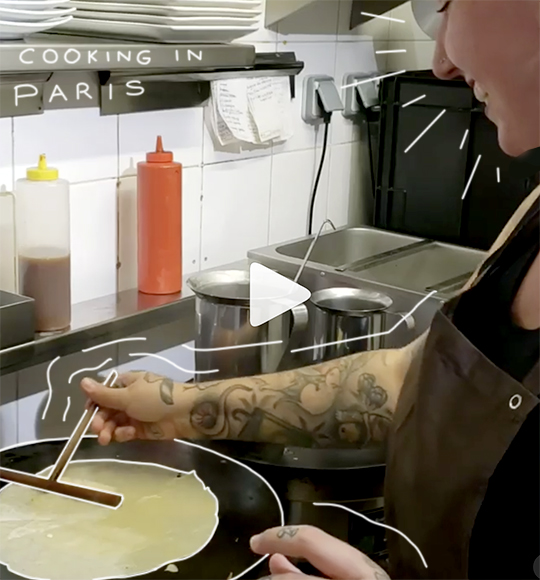
✅ PLAN: What will you do to start living in French?
What are you most looking forward to? What other ideas do you have for integrating French into your life?
8. The French Learning Community
Now that you have your French adventure map (guiding resource), plenty of fun stops along the way (immersion), and plenty of great fuel (embodying French), there’s one last thing we need:
A community of adventurers.
To find the French learning community online, I suggest a few different places:
- FACEBOOK – Search for the word “polyglot” and you’ll find tons of groups for and by language learners of every variety.
- INSTAGRAM – Check out the hashtags #polyglots #learningfrench #frenchteacher #frenchimmersion #frenchexchange, or follow me as @MultilingualMarissa
- YOUTUBE – Search for “French learning tips”, “speaking French”, “learning French”, or follow me as Relearn A Language.
Have any other questions about learning French? Any ideas about things that should be added to this article? Leave them below in the comments!

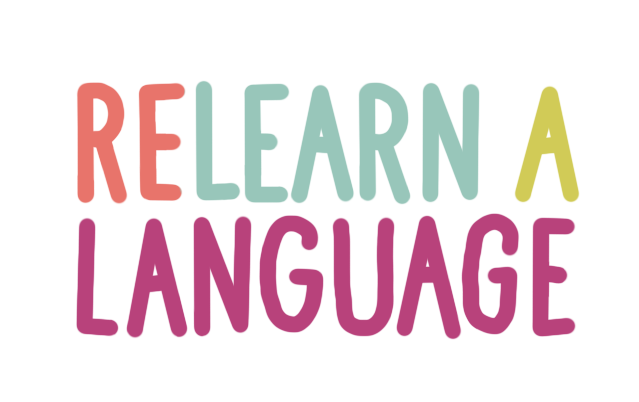
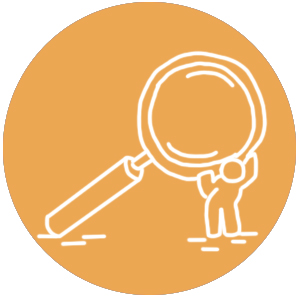
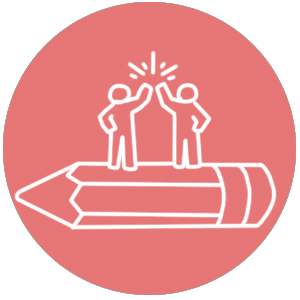
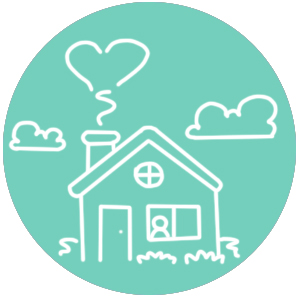
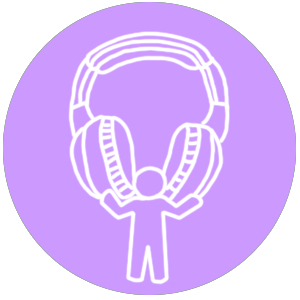
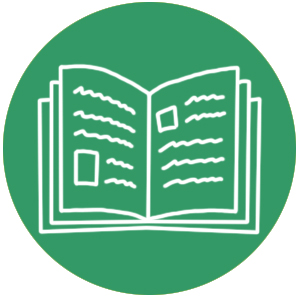
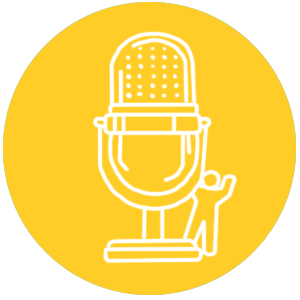
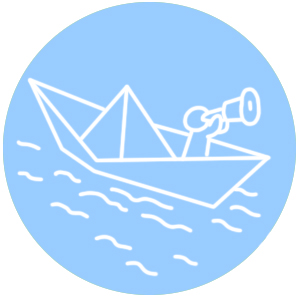
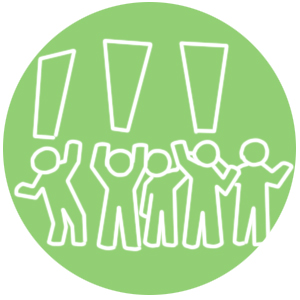
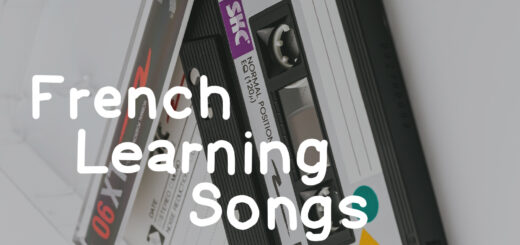
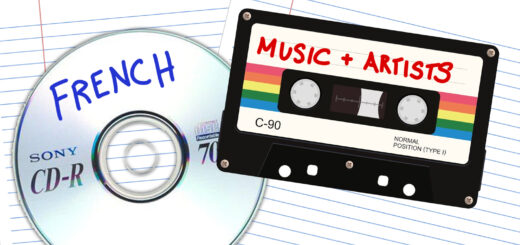

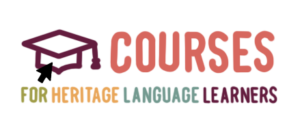
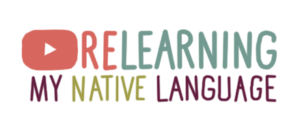
Hello Marissa,
I am unable to register to your mini course, would you be kind enough to help me out?
“Unexpected error. Please try again”, this is the message being shown.
Hi Arun! I just checked and there doesn’t seem to be any problem on my end (and plenty of people have signed up this week). I would try with a different browser? Let me know if it still doesn’t come through and I can try to manually add you.